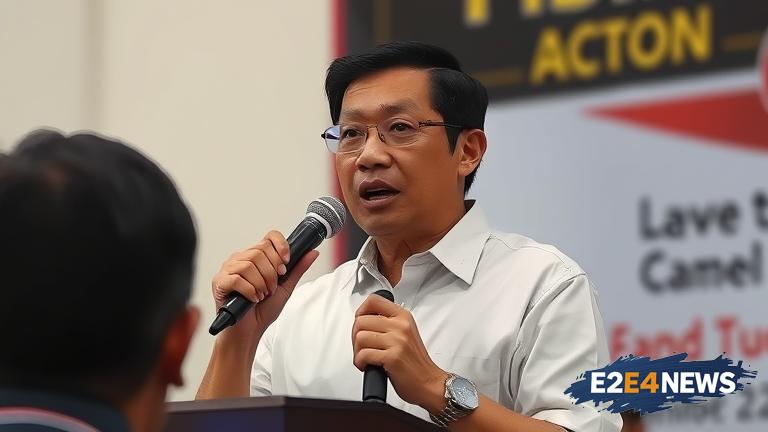Representative Albee Benitez, a prominent lawmaker in the Philippines, has recently joined the growing chorus of voices calling for a more equitable distribution of funds in the country. This move is seen as a significant step towards promoting transparency and accountability in the budget allocation process. Benitez, who has been a vocal advocate for good governance, emphasized the importance of ensuring that funds are allocated in a fair and just manner. He noted that the current system often favors certain regions or projects, leaving others underfunded and neglected. The lawmaker argued that this can lead to a widening of the gap between the rich and the poor, as well as exacerbate existing social and economic inequalities. Benitez proposed that a more equitable distribution of funds can be achieved through a thorough review of the budget allocation process, taking into account the unique needs and priorities of each region. He also suggested that the government should prioritize projects that have a direct impact on the lives of ordinary citizens, such as infrastructure development, education, and healthcare. Furthermore, Benitez called for greater transparency and accountability in the budget allocation process, including the publication of detailed reports on fund allocations and utilization. This, he believes, will help prevent corruption and ensure that funds are used for their intended purposes. The lawmaker’s call for an equitable distribution of funds has been welcomed by various stakeholders, including civil society groups and community leaders. They see this as an opportunity to address long-standing issues of inequality and underdevelopment in the country. However, others have expressed skepticism, citing the complexity of the budget allocation process and the need for a more nuanced approach. Despite these challenges, Benitez remains committed to his advocacy, believing that a fair and equitable distribution of funds is essential for promoting sustainable development and reducing poverty in the Philippines. The country’s budget allocation process has long been criticized for being opaque and prone to corruption. Benitez’s proposal aims to address these issues by introducing greater transparency and accountability. The lawmaker’s initiative has also sparked a wider debate on the need for budget reform in the Philippines. Many experts believe that the current system is in need of a major overhaul, with some calling for a more decentralized approach to budget allocation. Others have proposed the establishment of an independent budget office to oversee the allocation and utilization of funds. As the debate continues, Benitez’s call for an equitable distribution of funds remains a key point of discussion. The lawmaker’s advocacy has also highlighted the importance of citizen participation in the budget allocation process. He believes that citizens should have a greater say in how funds are allocated, and that their needs and priorities should be taken into account. In response to Benitez’s proposal, the government has announced plans to review the budget allocation process and explore ways to make it more transparent and accountable. While the outcome of this review is still uncertain, many see it as a positive step towards addressing the long-standing issues of inequality and underdevelopment in the Philippines. The call for an equitable distribution of funds has also sparked a wider discussion on the role of governance in promoting sustainable development. Many experts believe that good governance is essential for ensuring that funds are allocated and utilized effectively. Benitez’s advocacy has highlighted the need for greater transparency and accountability in the budget allocation process, as well as the importance of citizen participation and oversight. As the Philippines continues to grapple with the challenges of poverty and inequality, the call for an equitable distribution of funds remains a critical issue. Benitez’s proposal has sparked a wider debate on the need for budget reform, and his advocacy is seen as an important step towards promoting transparency, accountability, and good governance in the country.





